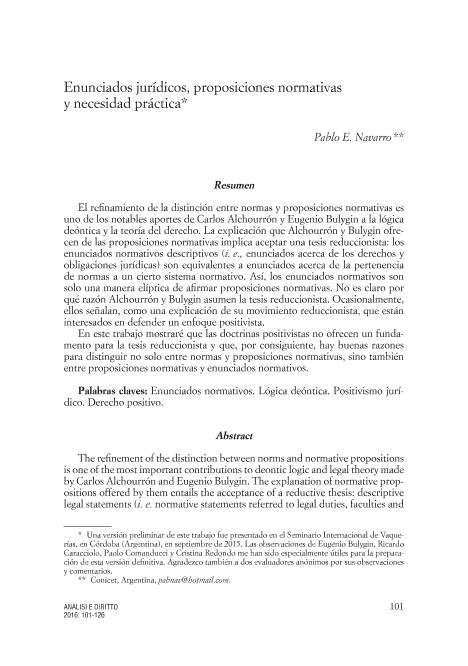Mostrar el registro sencillo del ítem
dc.contributor.author
Navarro, Pablo Eugenio

dc.date.available
2022-05-02T13:40:20Z
dc.date.issued
2016-05
dc.identifier.citation
Navarro, Pablo Eugenio; Enunciados jurídicos, proposiciones normativas y necesidad práctica; Marcial Pons; Analisi e Diritto; 2016; 5-2016; 101-126
dc.identifier.issn
1126-5779
dc.identifier.uri
http://hdl.handle.net/11336/156206
dc.description.abstract
El refinamiento de la distinción entre normas y proposiciones normativas esuno de los notables aportes de Carlos Alchourrón y Eugenio Bulygin a la lógicadeóntica y la teoría del derecho. La explicación que Alchourrón y Bulygin ofrecen de las proposiciones normativas implica aceptar una tesis reduccionista: los enunciados normativos descriptivos (i. e., enunciados acerca de los derechos y obligaciones jurídicas) son equivalentes a enunciados acerca de la pertenenciade normas a un cierto sistema normativo. Así, los enunciados normativos sonsolo una manera elíptica de afirmar proposiciones normativas. No es claro porqué razón Alchourrón y Bulygin asumen la tesis reduccionista. Ocasionalmente,ellos señalan, como una explicación de su movimiento reduccionista, que estáninteresados en defender un enfoque positivista.En este trabajo mostraré que las doctrinas positivistas no ofrecen un fundamentopara la tesis reduccionista y que, por consiguiente, hay buenas razonespara distinguir no solo entre normas y proposiciones normativas, sino tambiénentre proposiciones normativas y enunciados normativos
dc.description.abstract
The refinement of the distinction between norms and normative propositions is one of the most important contributions to deontic logic and legal theory made by Carlos Alchourrón and Eugenio Bulygin. The explanation of normative propositions offered by them entails the acceptance of a reductive thesis: descriptive legal statements (i. e. normative statements referred to legal duties, faculties and so on) are equivalent to propositions about the membership of norms in a legal system. Thus, legal statements would only be elliptical normative proposicions. However, it is not altogecher clear the reason for accepting the redu ccive thesis. Occasionally, Alchourrón and Bulygin claim that they subscribe such a thesis because they are mainly interested on positive law and positivistic approaches. In this paper I will show that the reductive thesis is not founded on legal positivism. Therefore, it would be a conceptual space for distinguishing no only between norms and normative propositions, but also between legal statements and normative propositions.
dc.format
application/pdf
dc.language.iso
spa
dc.publisher
Marcial Pons
dc.rights
info:eu-repo/semantics/openAccess
dc.rights.uri
https://creativecommons.org/licenses/by-nc-sa/2.5/ar/
dc.subject
ENUNCIADOS JURÍDICOS
dc.subject
LÓGICO DEÓNTICA
dc.subject
POSTIVISMO JURÍDICO
dc.subject.classification
Otras Derecho

dc.subject.classification
Derecho

dc.subject.classification
CIENCIAS SOCIALES

dc.title
Enunciados jurídicos, proposiciones normativas y necesidad práctica
dc.title
Legal statements, normative propositions and practical necessity
dc.type
info:eu-repo/semantics/article
dc.type
info:ar-repo/semantics/artículo
dc.type
info:eu-repo/semantics/publishedVersion
dc.date.updated
2022-04-28T14:15:14Z
dc.journal.volume
2016
dc.journal.pagination
101-126
dc.journal.pais
Italia

dc.journal.ciudad
Génova
dc.description.fil
Fil: Navarro, Pablo Eugenio. Universidad Nacional de Córdoba. Centro de Investigaciones Jurídicas y Sociales. Consejo Nacional de Investigaciones Científicas y Técnicas. Centro Científico Tecnológico Conicet - Córdoba. Centro de Investigaciones Jurídicas y Sociales; Argentina
dc.journal.title
Analisi e Diritto
dc.relation.alternativeid
info:eu-repo/semantics/altIdentifier/url/http://ref.scielo.org/shzmvw
dc.relation.alternativeid
info:eu-repo/semantics/altIdentifier/url/https://dialnet.unirioja.es/servlet/articulo?codigo=5860035
Archivos asociados
